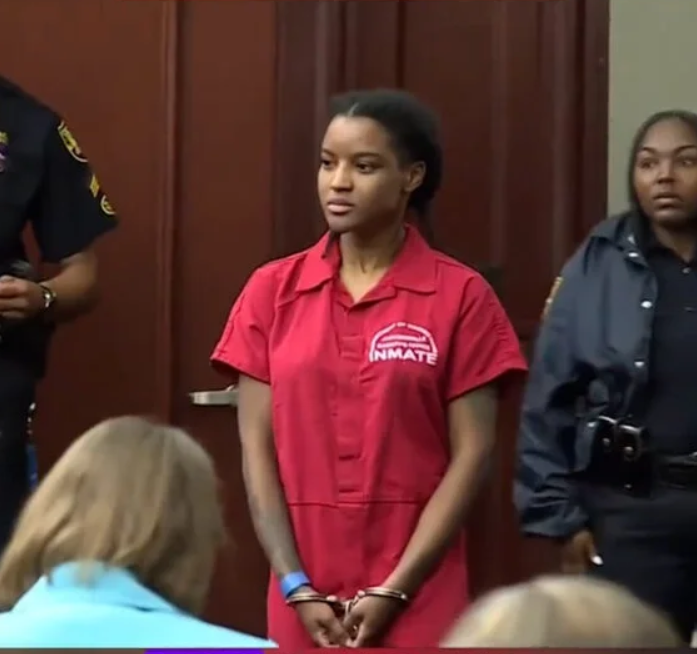The Morning the World Went Silent
The courtroom was colder than usual. The woman standing at the defense table wore a red inmate jumpsuit, her wrists trembling against the weight of steel cuffs.
Her eyes weren’t wild or angry — they were empty. Hollow. As if every tear she’d ever cried had already dried long before this moment.
Reporters whispered among themselves, but the room itself felt frozen in disbelief.
How could a mother — a mother — do what she did?
The judge looked at her and asked the question everyone wanted answered:
“Why?”
She didn’t lift her head. Didn’t cry. Didn’t plead.
Her only words were quiet, nearly broken:
“Because no one heard me when I begged for help.”
The Unraveling of a Life
Before the tragedy, she had been known as a devoted mother — patient, gentle, working double shifts to keep food on the table for her two children: a five-year-old boy who loved drawing spaceships, and a seven-year-old girl who dreamed of becoming a dancer.
But behind the closed doors of their small apartment, life was far from peaceful.
The children’s father had left years before, leaving her buried under bills, exhaustion, and loneliness.
The walls of her home began to feel like a cage — and in the silence of every night, she would whisper to herself, “I can’t do this anymore.”
Friends noticed the change first — the dark circles, the distant stares, the way her smile began to fade.
One neighbor later testified,
“She was slipping. You could see it. She was asking for help without using words.”
But no one listened.
And when the social workers finally came, it was too late.
The Night That Changed Everything
It was raining that night — soft, steady rain that painted the windows with streaks of silver.
She sat on the couch, holding her children close, whispering lullabies like she used to. They fell asleep in her arms, their breathing slow, peaceful.
She stood there for a long time, staring at them — torn between love and despair, between wanting to save them and wanting to save herself.
In her mind, she wasn’t ending their lives. She was ending their pain.
Later, in her confession, she said softly,
“I thought if they went to heaven, they wouldn’t have to grow up like me — tired, alone, and forgotten.”
When police arrived the next morning, they found her sitting on the floor beside her children, her hands folded, a note beside her that read simply:
“Forgive me.”
The Trial That Shattered the Nation
The courtroom became a battlefield of emotion.
The prosecutor called her a monster.
The defense called her a victim of silence.
Psychiatrists testified about depression, trauma, and years of untreated mental illness.
But the public saw only one thing — two small coffins and a mother in handcuffs.
When it was her turn to speak, she finally looked up at the judge.
Her voice was soft, almost childlike:
“I didn’t want to kill them. I just wanted the pain to stop. I begged for help. Nobody came.”
The judge lowered his head, his voice quiet as he read the sentence: Life in prison without parole.
Gasps filled the room.
But she didn’t react. She just whispered,
“At least now I can’t hurt anyone again.”
The Aftermath of a Broken Heart
In the years that followed, her story spread across the nation — a chilling, tragic reminder of what happens when despair goes unnoticed.
Documentaries would later call her “the mother who cried for help that never came.”
Behind bars, she rarely speaks. Her cell wall is lined with crayon drawings of two smiling children — drawn from memory. Every year on their birthdays, she writes letters she can never send.
In one of them, she wrote,
“I know the world hates me. I do too. But I hope one day, someone listens to the next mother who says she’s not okay — before it’s too late.”
And that, perhaps, is the cruelest truth of all — that her story wasn’t about evil, but about pain left to rot until love itself broke under the weight of it.

